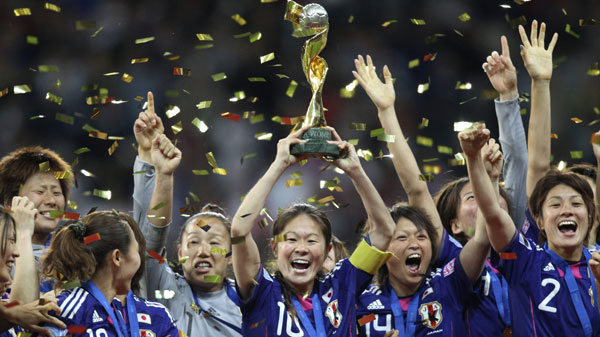
Congratulations to Japan for being crowned World Champions. But the USA really threw this one away. Squandered chances (especially in the first half), shocking defensive errors in the clutch, dubious coaching decisions, and poor penalty shooting left many of us embittered at the end of the night. Still, Sawa’s goal in the 117th minute was pure genius. A perfect symbol of the skill, movement, and self-belief of the Japanese side. Maybe Marta won’t be named FIFA Player of the Year in 2011!
Watch highlights here.
Author: Peter Alegi
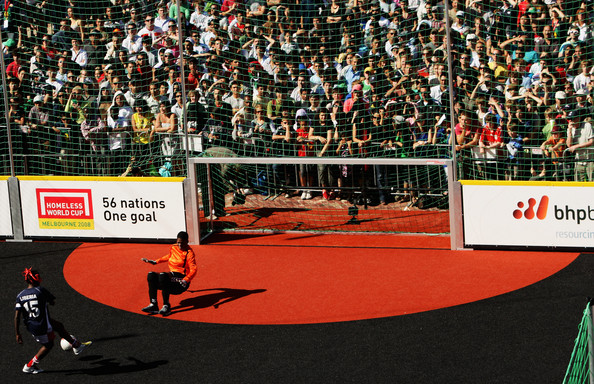
With the Homeless World Cup about to start, Inês Santinhos Gonçalves of Street News Service looks at the power of a ball to create change. Does football have the power to lift those at the bottom out of poverty, or even make them rich? Includes interviews with David Goldblatt, Jonathan Magee, and me.
Read full article here.
Mentalità Americana
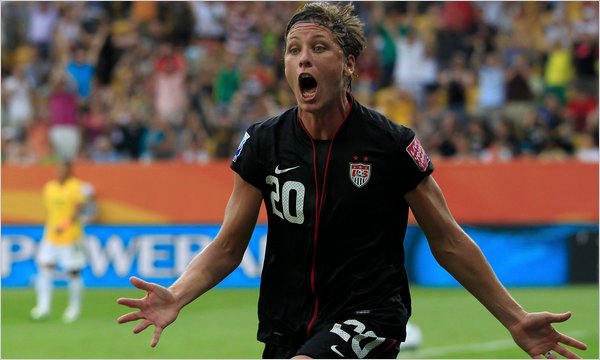
So nobody here in Italy gives a hoot about the Women’s World Cup.
None of the three sport dailies have given the tournament any decent coverage, little more than scores and a sidebar while the rest of the paper is devoted to summer serie A pre-season gossip, Formula 1 profiles, and lame lifestyle pieces. The WWC games are shown on satellite only, with no substantial highlights on TV despite the fact that this football-mad nation has nothing other than dull (so far) Copa America in the middle of the night to keep millions entertained.
Due to Apple’s lack of cooperation with Adobe (makers of flash player used by fifa’s web site), I resorted to following the USA-Brazil on Espn gamecast . . . here we were, the whole family at the dinner table crowded around an iPad waiting breathlessly for the next line of text to narrate what was happening on the pitch.
Decoding the intensity of the events, the odd calls, cautions and ejections, it was all very strange, but captivating. In a 1930s kind of way, when crowds used to gather in the streets and piazzas to hear a guy read out updates sent by telegraph.
Wambach’s goal had us leaping out of our seats, chicken, tomatoes, buffalo mozzarella, and peppers flying around like it was Carnival! The PKs were a bit challenging to follow since no text appeared until the last couple of penalties.
As dessert beckoned, the final score read USA – Brazil 5-3 — actually 2-2 (5-3). Youtube generously and quickly provided the highlights a few minutes ago. Thank goodness for the internet. And praise be to football.
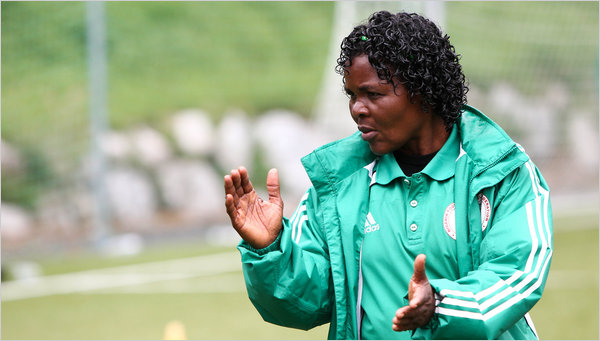
The New York Times today has a piece by Jere Longman about homophobia in the Nigerian team about to play in the 2011 Women’s World Cup. While it’s nice to see the newspaper of record in the U.S. paying attention to the women’s game and to African women in particular, the overall thrust of the article is that homophobia is an example of the “cultural obstacles that remain for many African women who play soccer.”
The story focuses on a single character: head coach Eucharia Uche. A former player and fervent evangelical Christian, Uche claims to have “used religion in an attempt to rid her team of homosexual behavior,” describing the latter as a “dirty issue,” and “spiritually, morally very wrong.”
There are several problems with the article, but I’ll focus on two key ones: (1) blaming “culture,” and (2) African “exceptionalism.” Let’s tackle the first one. While “cultural inhibitions are still cited as inhibitions to girls playing” notes Martha Saavedra’s seminal 2003 overview of the African women’s game published in Soccer and Society, “the general economic troubles and the lack of resources overall is still perhaps the most serious hindrance. Even the bans on women’s football in Northern Nigeria may be indirectly linked to this.” Yes, cultural conservatism (not “culture”) is a factor in some areas, but this does not necessarily apply to all of Nigeria, let alone all of “Africa” as the article’s headline suggests.
This reductionism leads to my second point: African exceptionalism. The first thirteen paragraphs of the article create the impression that homophobia is a singularly “African” issue. It is only in the 14th paragraph that some de-exoticization finally takes place: “The treatment of lesbians in sport is not a matter restricted to women in Africa. Some women on previous United States national soccer teams have been reluctant to live openly gay lifestyles for fear of repercussions.” Surely, American readers of the Times would have been quite interested to learn more about the existence of a “culture” of silence and repression in elite U.S. soccer. It might even invite a comparison with the grim situation in Uche’s squad.
The lack of discussion about women’s football in Nigeria is puzzling as well. The article contains not a single reference to the rich history of the game in Africa’s most populous nation. As I write in African Soccerscapes, women in Nigeria were playing as early as 1943. The 20 October 1943 issue of the Nigerian Spokesman newspaper ran this story:
In response to the demand of the people of Onitsha, the Sierra Leonean friendly Society has started to make arrangements for the replay of the ladies’ football mach which so thrilled the township recently. Good news for football enthusiasts . . . It was the first of its kind to be staged in Onitsha.” Fine show but not up to the standard of boys soccer. “It seemed odd to some to see our women in shorts kicking a football about the field, or clashing with one another after the manner of men . . . but the game itself, when it came to be played, exploded all the fantastic theories some malevolent individuals had concocted about it, and it was a colossal success both in the fun that it provided and on the financial side of it.
By 1960 (Nigeria’s independence) there were women’s teams in Jos, Lagos, Calabar, Onitsha, Kanu, Enugu and other towns. By 1989 there were 28 women’s clubs active, as well as a Nigerian Female Football Organizers Association. This history is vital to gaining a sharper understanding of the Super Falcons’ continental dominance since they first represented Africa at the WWC in 1991.
Let’s hope that future U.S. media coverage of the 2011 WWC will be more informed and more tightly focused on the game itself. The fans deserve it. The players deserve it. Football deserves it.
Detroit River Derby
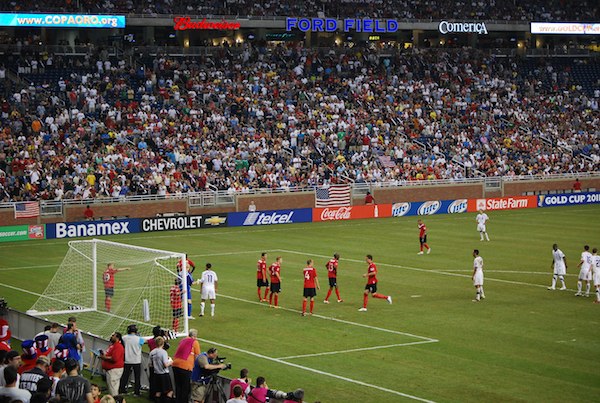
Having witnessed the USA’s last victory in November against South Africa in Cape Town, our 9-year-old daughters proved themselves lucky talismans for the Americans again on Tuesday (a school night!) against Canada in a Gold Cup match at Ford Field in Detroit.
It was my first football match indoors. Ford Field’s warehouse ambience infused the Detroit River derby with a blue-collar chic feel. We welcomed the oddly pleasant sensation of walking into an air-conditioned stadium on a scorchingly hot and humid afternoon.
We arrived early enough to watch Panama – Guadeloupe with a few thousand hard core aficionados. The heavily favored Panamanians scored twice (’29 and ’32) before Guadeloupe’s Tacalfred got a straight red for a rather innocuous foul on Luis Henríquez. Reduced to ten men, the Gwada Boys came to life as the game got chippy.
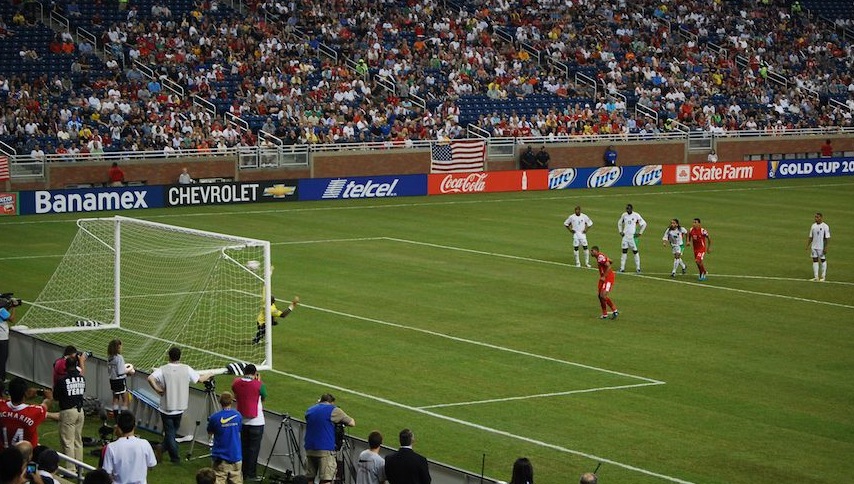
Panama’s third goal — an authoritative penalty by Gomez — seemed to bury the game a few minutes into the second half. (The PK was actually taken twice. Gomez “spooned” the first one into the net.) Content and over-confident, Panama switched off. Guadeloupe fought back. Substitute striker Jovial poached two well-taken goals to make the closing moments tense and exciting. Final score: 3-2 Panama.
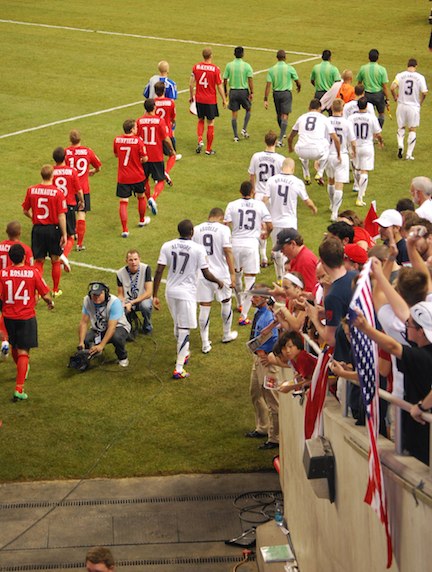
The ritual procession of the USA and Canada out of the tunnel three rows below us midwifed a roar from the crowd of 28,000. “O Canada, we stand on guard for thee,” sang a few hundred Canadian ultras in the North End. Sam’s Army in the South End led the home fans in a spirited response: “And the rockets’ red glare, the bombs bursting in air, gave proof through the night that our flag was still there.” Are we ready to rumble?
Canada sat back on defense, hoping to spring counterattacks. FIfteen minutes in, Lars Hirschfeld’s comical goalkeeping error on Altidore’s simple shot from a tight angle gifted the US the lead. Despite a lot of huffing and puffing on Ford Field’s soft and slightly unstable grass surface, Canada hardly threatened. 1-0 at the break. Our daughters devoted themselves to their new pastimes: Anna, wearing her Messi Barca jersey, went autograph hunting among the Panamanian squad members seated right behind us; Sophie, clad in a Mia Hamm number 9 shirt, snapped photos.
One of the highlights of the second half was an on-duty police officer leading the “U-S-A! U-S-A!” chants in our section. He enjoyed it so much that he continued cheerleading in other sections of the lower bowl. Highlights on the pitch came courtesy of Clint Dempsey. First, he nearly scored a goal for the ages: a flying backward heel shot at the back post cleared miraculously by a Canadian defender’s jaw. Then he buried the Canadians in the 62nd minute. Altidore sent in a low cross from the right flank and Deuce slid in at the far post — like the quasi-goal earlier — and made it 2-0. Great goal. Classic Dempsey.
There was still time for the Tim Howard Show: a one-handed diving save off a thunderous Ali Gerba shot, and then back-to-back stops in the dying minutes inside the six-yard-box. Clean sheet preserved. Final score: 2-0. The US players thanked us and we filed happily out of the football warehouse and out into the steamy Detroit night.

Stick it to The Man: Fick Fufa

Fifa has turned the World Cup into a corporate jamboree, yet it’s the fans who have to pick up the pieces writes Mark Perryman, co-founder of Philosophy Football. In 2010 at their World Cup dissident South African fans used the slogan FICK FUFA. Now Perryman’s group put it on a campaign T-shirt as a manifesto to clear up Sepp’s mess. Buy it here.
Read Perryman’s article in The Guardian here.
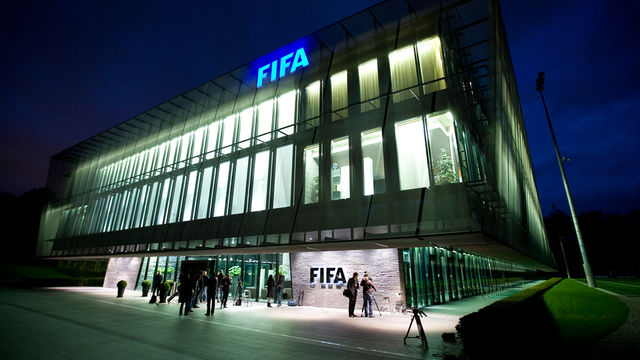
FIFA’s newest corruption scandal and Blatter’s tragicomic re-election make David Goldblatt’s BBC radio documentary a must-listen. The author of The Ball is Round asks what is FIFA? Where has it come from and who is it for? Goldblatt hears from those who have documented FIFA’s story and its secrets and from those who have helped to shape its modern identity.
Click here to listen.